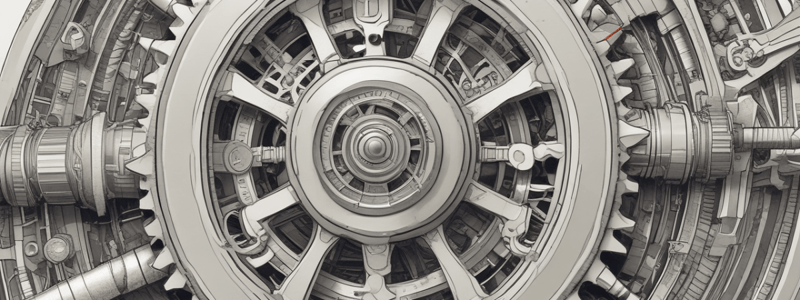Podcast
Questions and Answers
What happens to the Mechanical Advantage (MA) when the height decreases and length remains constant?
What happens to the Mechanical Advantage (MA) when the height decreases and length remains constant?
- MA fluctuates
- MA increases (correct)
- MA decreases
- MA remains constant
How can you increase the Mechanical Advantage (MA) of a system?
How can you increase the Mechanical Advantage (MA) of a system?
- Increase both length and height (correct)
- Increase height and decrease length
- Decrease height and increase length
- Decrease both length and height
What is the Gear Ratio (GR) if the MA is 2 in a gear system where the driver turns once?
What is the Gear Ratio (GR) if the MA is 2 in a gear system where the driver turns once?
- GR = 3:2
- GR = 1:1
- GR = 1:2 (correct)
- GR = 2:1
How does friction affect the Mechanical Advantage of a machine?
How does friction affect the Mechanical Advantage of a machine?
What is Efficiency a measurement of in a machine or device?
What is Efficiency a measurement of in a machine or device?
What is the formula for calculating Mechanical Advantage of levers when knowing the force applied?
What is the formula for calculating Mechanical Advantage of levers when knowing the force applied?
If a lever has an output force of 450N and an input force of 150N, what is the Mechanical Advantage of the lever?
If a lever has an output force of 450N and an input force of 150N, what is the Mechanical Advantage of the lever?
How does an increase in Mechanical Advantage affect the effort needed to move an object using a lever?
How does an increase in Mechanical Advantage affect the effort needed to move an object using a lever?
What happens to Mechanical Advantage if it equals zero?
What happens to Mechanical Advantage if it equals zero?
In calculating Mechanical Advantage for levers, what does the output arm distance to input arm distance ratio represent?
In calculating Mechanical Advantage for levers, what does the output arm distance to input arm distance ratio represent?
What is the mechanical advantage of a screw with a radius of 6mm and pitch of 2mm?
What is the mechanical advantage of a screw with a radius of 6mm and pitch of 2mm?
What is the formula for calculating Mechanical Advantage of a lever?
What is the formula for calculating Mechanical Advantage of a lever?
In the scenario mentioned, what would happen to the Mechanical Advantage if the output arm of the lever is shortened?
In the scenario mentioned, what would happen to the Mechanical Advantage if the output arm of the lever is shortened?
How does using a screwdriver or power tool affect the mechanical advantage of a screw?
How does using a screwdriver or power tool affect the mechanical advantage of a screw?
When calculating the mechanical advantage for an inclined plane, what does an increase in length and constant height do to the MA?
When calculating the mechanical advantage for an inclined plane, what does an increase in length and constant height do to the MA?
How does friction impact Mechanical Advantage in a system?
How does friction impact Mechanical Advantage in a system?
What is the mechanical advantage of a gear train with a gear ratio of 4:1?
What is the mechanical advantage of a gear train with a gear ratio of 4:1?
What is the unit for Mechanical Advantage?
What is the unit for Mechanical Advantage?
How does friction impact the mechanical advantage in machines?
How does friction impact the mechanical advantage in machines?
When using gears in a system, how does increasing the Gear Ratio affect Mechanical Advantage?
When using gears in a system, how does increasing the Gear Ratio affect Mechanical Advantage?
Flashcards are hidden until you start studying
Study Notes
Mechanical Advantage (MA)
- Mechanical Advantage is the amount by which a machine can multiply a force.
- MA can be calculated in two ways: by knowing the output and input force, or by knowing the input arm distance and output arm distance.
Calculating Mechanical Advantage
- MA = output force / input force (load) / (force you apply)
- MA = input arm distance / output arm distance
Mechanical Advantage of Gears and Gear Trains
- Gear Ratio (GR) is used to calculate MA
- MA = GR, where GR = 1:2, means for every one turn of the driver, the driven turns two times
Effects of Friction on Mechanical Advantage
- Friction can reduce the efficiency of a machine and decrease MA
- Friction can be reduced by lubricating moving parts
Efficiency
- Efficiency is a measurement of how well a machine or device uses energy
- Friction negatively affects efficiency
Calculating Mechanical Advantage of Levers
- MA = output force / input force (load) / (force you apply)
- MA = input arm distance / output arm distance
Rules of Mechanical Advantage
- If MA = 0, there is no mechanical advantage
- If MA > 0, you have mechanical advantage, and the higher the MA, the greater the advantage
- Using a machine with MA makes it easier to move an object
Calculating Mechanical Advantage of Pulleys
- MA = number of pulleys in the system
Calculating Mechanical Advantage of Screws
- MA = 2πr / p, where r is the radius of the screw head and p is the pitch of the screw
Calculating Mechanical Advantage of Inclined Planes
- MA = length of slope / height of the slope
Studying That Suits You
Use AI to generate personalized quizzes and flashcards to suit your learning preferences.




